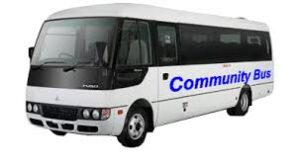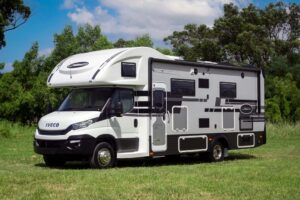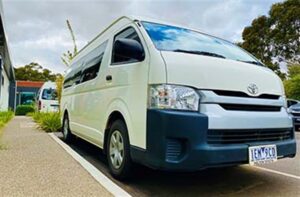This article aims to delve into the intricacies of an LR Licence, its necessity, the process for obtaining it, the advantages it provides, and the diverse career possibilities that arise post-licensure.
Let us delve into and further explore the dynamic realm of driving with an LR Licence.
Key Takeaways:
- LR Licence: Required to drive small buses, minibus for schools and nursing homes, community buses, motorhomes, and courier trucks.
- Obtaining an LR Licence: Meet eligibility requirements, complete necessary training, and pass the LR Licence test.
- Benefits of an LR Licence: Increased job opportunities, ability to drive a variety of vehicles, and higher salary potential.
What Is an LR Licence?
An LR licence, formally referred to as a Light Rigid licence, serves as an official certification permitting individuals to operate light rigid vehicles, which encompass vehicles such as buses, motorhomes, and courier trucks. Possession of this licence demonstrates the holder’s proficiency in driving and managing specific classes of vehicles.
These licences play a crucial role for individuals venturing into careers within commercial driving, transportation, or delivery services. The LR licence pertains to vehicles with a weight range of 4.5 to 8 tonnes, equipping individuals with the capacity to operate larger vehicles with accuracy and efficiency.
Acquiring an LR licence typically entails participation in training programs, successful completion of written and practical driving assessments, and meeting specific medical and age-related criteria. Sustaining an LR licence may necessitate periodic renewal processes and adherence to road regulations to ensure continual eligibility for operating light rigid vehicles on public roadways.
1. Small Buses
The acquisition of an LR licence enables individuals to operate small buses commonly designated for the provision of transportation services to a limited number of passengers. These buses are subject to specific vehicle mass and Gross Vehicle Mass (GVM) requirements, which the driver must strictly adhere to.
Small buses under LR licence restrictions typically accommodate approximately 25 passengers, rendering them suitable for applications such as shuttle services, school transportation, and excursions involving small groups. The possession of an LR licence is paramount for ensuring the safety of both the driver and passengers, as it indicates that the driver has received specialized training in the operation of larger vehicles. Drivers holding an LR licence are adept at comprehending the limitations associated with vehicle mass and GVM, thereby guaranteeing that the bus operates within safe parameters while on the road.
2. Minibuses for Schools and Nursing Homes

Possession of an LR licence is imperative for the operation of minibuses utilized in school transportation and nursing home services. These vehicles are designed to meet specific requirements and demand drivers who hold the necessary licensing and expertise to guarantee the safety and comfort of passengers.
Individuals who possess an LR licence have undergone specialized training to effectively manage the distinct challenges associated with transporting passengers in environments such as schools and nursing homes. They are proficient in navigating through congested school zones, efficiently coordinating pick-up and drop-off schedules, and ensuring the welfare of passengers with diverse needs.
Within nursing home settings, drivers assume a pivotal role in delivering a secure and comfortable transportation experience for elderly residents. The duties of an LR licence holder transcend mere driving tasks; they must also engage in effective communication with passengers and staff to uphold a journey that is both safe and enjoyable.
3. Community Buses
Operating community buses requires the possession of an LR licence, which serves as an indication of the driver’s competence to safely manage these vehicles within the realm of community service. This licence validates that the driver fulfills specific criteria essential for the efficient operation of community transportation.
Possession of an LR licence not only signifies the driver’s technical adeptness but also highlights their capability to navigate various passenger interactions with politeness and professionalism. Adherence to regulatory standards is integral to upholding the safety and credibility of community bus operations, emphasizing the importance for drivers to conform to stringent guidelines and protocols.
These rigorous measures ensure that drivers maintain the trust and confidence of passengers while delivering dependable and secure transportation services to the community.
4. Motorhomes

The operation of motorhomes necessitates the possession of an LR licence, indicating that drivers have the requisite skills to effectively manage these larger recreational vehicles. This licence serves to validate the driver’s competence in safely driving and maneuvering motorhomes across diverse road conditions.
Driving a motorhome demands a heightened level of attentiveness in comparison to operating a standard vehicle, primarily due to the augmented dimensions and weight of the vehicle. Holders of an LR licence undergo training to adeptly navigate confined spaces, maneuver in reverse with confidence, and adapt to the distinctive turning radius of these oversized vehicles. Understanding the distinct challenges associated with motorhomes, including extended braking distances and vulnerability to crosswinds, is imperative for ensuring safe driving practices.
Possession of an LR licence not only demonstrates a driver’s proficiency but also underscores their dedication to upholding road safety standards while operating motorhomes.
5. Courier Trucks

Courier trucks necessitate drivers possessing an LR licence to effectively manage the transportation and delivery of goods. Acquiring this licence entails successfully passing a specialized test designed to assess the driver’s proficiency in operating and maneuvering courier trucks.
Possession of an LR licence is paramount as it indicates that the driver has fulfilled the requisite criteria for operating larger vehicles like courier trucks. To successfully navigate the LR licence test, individuals must exhibit their comprehension of vehicle controls, adherence to safe driving practices, and spatial awareness. This certification guarantees that drivers are equipped to undertake the responsibilities associated with driving a courier truck, including loading and unloading goods, adhering to delivery schedules, and safely navigating through diverse traffic conditions.
Holding an LR licence not only unlocks employment opportunities within the courier industry but also underscores a driver’s capacity to effectively manage the demands of the role.
Why Do You Need an LR Licence?
Acquiring an LR license is essential as it grants individuals the authorization to operate vehicles falling under specific vehicle mass classifications, thereby ensuring that drivers possess the necessary competence and qualifications to safely operate such vehicles. The Roads and Maritime Services (RMS) has mandated the possession of an LR license for designated vehicle categories.
This rigorous requirement established by the RMS is designed to improve road safety by ensuring that only drivers who have the requisite skills and expertise are entrusted to operate heavy vehicles. Holders of an LR license are expected to demonstrate a comprehensive understanding of the operation of vehicles with substantial mass, given that the handling and maneuvering of such vehicles necessitate specialized training. Possession of an LR license signifies adherence to the legal regulations governing the operation of heavier vehicles on public roads, thereby contributing to the overarching objective of enhancing road safety.
How to Obtain an LR Licence?
Obtaining an LR licence necessitates the completion of requisite training programs and assessments to demonstrate driving competency and skills. The successful fulfillment of these training courses and the passing of the LR licence test are fundamental steps towards procuring this certification.
The training for an LR licence comprises both theoretical and practical components to ensure that drivers are adequately equipped with the knowledge and skills necessary for safely operating larger vehicles. Aside from classroom sessions that cover road rules and regulations, prospective LR licence holders undergo on-road training to hone their driving proficiency under varying traffic conditions.
The assessment process typically encompasses a blend of written exams and practical driving tests designed to assess the candidate’s proficiency in handling the vehicle and navigating challenging scenarios. The successful completion of these assessments signifies the readiness and capability of the driver to operate an LR-class vehicle on the roads.
1. Meet the Eligibility Requirements
To obtain an LR licence, candidates must satisfy specific eligibility criteria concerning their driving experience, age, and proficiency in handling vehicles. These licence prerequisites may be subject to variation depending on the candidate’s prior driving background and the categories of vehicles they have operated.
A fundamental requirement for acquiring an LR licence is the minimum duration of driving experience. Typically, candidates are expected to have possessed a full car licence for a specified number of years before becoming eligible to apply for an LR licence. There may be age limitations in place to ensure that drivers have attained a level of maturity conducive to operating larger vehicles. Additionally, prior experience in driving vehicles of comparable dimensions and weight to those encompassed by an LR licence can significantly influence eligibility determinations.
2. Complete the Necessary Training
The completion of mandatory training programs, such as the Pro-action driver training programme, is imperative for individuals who are aspiring to acquire an LR licence. These training courses are specifically designed to enhance driving skills, promote safety awareness, and impart vehicle handling techniques that are tailored to LR vehicles.
Engaging in specialized training programs like the Pro-action driver training programme not only broadens individuals’ understanding of driving intricacies but also fosters a profound comprehension of safety protocols that are essential for the operation of LR vehicles. These training initiatives play a crucial role in refining the requisite competencies and expertise needed to effectively navigate challenging road scenarios.
Acquiring an LR licence demonstrates a dedication to road safety, instilling confidence in both drivers and fellow road users. The Pro-action driver training programme is distinguished for its comprehensive approach in equipping learners with practical skills and theoretical knowledge essential for excelling in obtaining an LR licence.
3. Pass the LR Licence Test
Successfully passing the LR licence test is a pivotal milestone in the journey towards obtaining certification, as it serves as an assessment of the driver’s proficiency in operating LR vehicles. The test encompasses both practical driving assessments and theoretical knowledge evaluations to ensure a comprehensive evaluation of driver readiness.
The practical driving assessment entails a thorough evaluation of candidates’ capacity to manage and navigate LR vehicles across diverse road and traffic scenarios. This component of the test concentrates on assessing the driver’s competency in tasks such as parking, reversing, turning, and overall vehicle operation.
Conversely, the theoretical knowledge assessment typically addresses subjects including road rules, safety regulations, and vehicle maintenance. Programs such as Pro-Driver Training play a critical role in readiness by providing candidates with structured courses that blend classroom instruction with practical driving experience. These programs equip aspiring drivers with the requisite skills and confidence to excel in the LR licence test.
What Are the Benefits of Obtaining an LR Licence?
Acquiring an LR licence confers several advantages upon individuals, including expanded career prospects, professional development opportunities, and the ability to enhance their driving capabilities within a professional context. It facilitates entry into a variety of job opportunities within the driving sector.
Possession of an LR licence not only furnishes individuals with the requisite skills for operating larger vehicles but also heightens their attractiveness to prospective employers within sectors such as public transport, logistics, and emergency services. With an LR licence, individuals can pursue roles as bus drivers, delivery drivers, or even advance to the operation of heavy vehicles, offering a pathway to a gratifying career with opportunities for progression.
This certification underscores a dedication to professionalism and proficiency within the driving industry, augmenting one’s credibility and marketability in the employment landscape.
1. Increased Job Opportunities
Possessing an LR licence significantly broadens the scope of job opportunities available to individuals seeking positions in the transportation sector, particularly in fields such as bus transportation, courier services, and community mobility. This certification serves as a key that unlocks a multitude of career pathways that require specialized knowledge of LR vehicles.
Individuals holding an LR licence can undertake a variety of roles, ranging from driving school buses to operating delivery vans, ensuring the safe and efficient transportation of goods and passengers. These roles not only offer diverse work environments but also provide individuals with the opportunity to demonstrate their driving skills in a range of scenarios. The demand for skilled drivers possessing an LR licence is steadily increasing as transportation services seek dependable professionals capable of efficiently navigating urban routes.
2. Ability to Drive a Variety of Vehicles
Possessing an LR licence grants individuals the authority to operate a diverse array of vehicles, encompassing heavy buses, motorhomes, and courier trucks. This licence serves as a testament to the driver’s proficiency and competency in operating a wide range of LR vehicles.
Furthermore, this permit not only authorizes individuals to drive vehicles such as buses and trucks, but it also necessitates a high degree of skill due to the size and weight of these heavy-duty vehicles. Operating heavy vehicles demands a distinct set of competencies compared to driving conventional cars, including heightened spatial awareness, extended braking distances, and the capability to navigate sharp turns and narrow passageways. Individuals holding an LR licence must exhibit proficiency in maneuvering sizable vehicles across varying traffic scenarios while prioritizing safety for both themselves and other road users.
3. Higher Salary Potential
Acquiring an LR licence can result in heightened salary prospects for individuals embarking on driving careers, as it unlocks opportunities for lucrative positions in sectors like courier services, transportation companies, and community mobility. The licence not only amplifies the earning potential but also broadens the horizons for career advancement among licensed drivers.
Possessing an LR licence transcends mere driving proficiency; it symbolizes an investment in one’s future. With this credential, drivers frequently secure roles offering augmented pay grades, performance incentives, and comprehensive benefits packages. Holding an LR licence signifies a dedication to professionalism and competency enhancement, paving the way for promotions and progress within the driving sector. The financial benefits extend beyond immediate wage increments, offering enduring stability and advancement opportunities for individuals who opt to invest in their career through licensure.
What Are the Job Opportunities with an LR Licence?
The possession of an LR licence presents a myriad of employment opportunities for individuals, spanning from roles within the NSW Ambulance Service to positions as school bus drivers, facilitating excursions for retirement villages, and operating community buses. This licence significantly expands the array of potential positions available to licensed drivers.
Furthermore, holding an LR licence can grant access to specialized driving environments, such as working as a driver for individuals with disabilities or transporting patients to medical appointments. Moreover, educational institutions frequently seek drivers with an LR licence to ensure the secure transportation of students during school outings and sporting events. Community service organizations may also mandate individuals with an LR licence to operate buses for group activities or excursions. The versatility of an LR licence enables individuals to delve into a wide spectrum of rewarding and impactful career pathways.
1. NSW Ambulance Service
An LR licence serves as a mandatory prerequisite for individuals seeking to join the NSW Ambulance Service as qualified drivers. This certification ensures that applicants are appropriately licensed to operate emergency vehicles, validating their competency and readiness for roles within the ambulance service.
The process of obtaining an LR licence entails meeting specific criteria established by the licensing authority. Prospective drivers are required to successfully complete a series of assessments designed to assess their understanding of road regulations, proficiency in vehicle operation, and familiarity with emergency response procedures. These stringent licensing standards are implemented to guarantee that drivers are adequately prepared to navigate complex scenarios while transporting patients.
Proficiency in emergency vehicle operations is paramount for drivers, as they are tasked with maneuvering through traffic efficiently and reaching emergency scenes promptly. Driver qualifications extend beyond basic driving competencies, encompassing the capacity to remain composed under pressure and make informed decisions – qualities that are essential for individuals serving within the Ambulance Service.
2. School Bus Driver
Obtaining certification as a school bus driver requires holding an LR licence, permitting individuals to safely transport students to and from educational facilities. This position involves a combination of driving duties and ensuring the well-being of students during their school commute.
Moreover, fostering positive interactions with students and cultivating a friendly and supportive atmosphere during the journey are key components of the role. School bus drivers are expected to demonstrate qualities like patience, empathy, and effective communication skills to effectively manage various situations that may arise during transit.
Compliance with stringent safety regulations is of utmost importance, encompassing adherence to traffic laws, conducting routine vehicle inspections, and following designated routes. Proficiency in driving skills, including the ability to maneuver in confined spaces, navigate diverse weather conditions, and employ defensive driving techniques, is imperative for the safe and efficient transportation of students.
3. Nursing Home Bus Driver
Operating buses for nursing home residents necessitates possession of an LR licence, serving as a testament to the driver’s capacity to deliver secure and comfortable transportation services for elderly passengers. The possession of this licence ensures that drivers possess the skills required to address the specific needs of nursing home residents during transit.
Possession of an LR licence indicates that the driver has completed specialized training focused on comprehending the unique challenges associated with transporting elderly passengers. This training extends beyond mere driving proficiency, emphasizing the establishment of a supportive and empathetic environment for individuals who may require additional assistance. Safety considerations are of utmost importance, with drivers well-prepared to manage mobility aids, secure wheelchairs, and provide a seamless and gentle journey. Prioritizing passenger comfort, drivers are trained to communicate effectively, maintain a serene atmosphere, and promptly address any concerns or requests that may arise.
4. Community Bus Driver
Community bus drivers are required to hold an LR licence in order to address the transportation needs of diverse community groups and provide mobility services to residents across a range of community settings. Possession of this licence enables individuals to pursue roles that are integral to the well-being of the community through the provision of efficient transportation services.
Possessing an LR licence elevates community bus drivers beyond their role as mere drivers; they serve as crucial conduits facilitating access to essential services such as healthcare appointments, employment opportunities, and social engagements. These drivers play a pivotal role in promoting inclusivity and accessibility for individuals who may encounter mobility limitations or lack access to private modes of transportation. Their unwavering commitment ensures that community members remain connected, involved, and self-reliant, thereby enriching the overall quality of life within the community they serve.
5. Motorhome Driver
Operating motorhomes necessitates holding an LR license, demonstrating the driver’s competence in managing these sizable recreational vehicles intended for travel and lodging purposes. This license validates that drivers possess the essential proficiencies to maneuver motorhomes safely on roadways and within various settings.
These large vehicles present distinct challenges due to their heightened dimensions, increased width, and substantial weight, necessitating drivers to exhibit a keen spatial awareness and adept maneuvering capabilities. Possession of an LR license signifies that drivers have undergone training to navigate these intricacies, which includes executing wide turns, parking in confined spaces, and adapting driving techniques in accordance with the vehicle’s dimensions and weight. Along with driving acumen, motorhome operators with an LR license are well-prepared to effectively manage emergency scenarios on the road, thereby ensuring the safety of themselves, passengers, and fellow road users.
6. Courier Truck Driver
Being a courier truck driver requires holding an LR licence, which signifies the driver’s ability to transport goods efficiently and meet delivery deadlines. This licence is a fundamental requirement for individuals seeking employment within the courier and logistics industry, ensuring adherence to vehicle operation regulations.
Courier truck drivers are tasked with securely loading and unloading parcels, navigating diverse routes to reach multiple delivery points promptly. Possessing an LR licence signifies a level of skill in operating larger vehicles, essential for maneuvering in urban environments and handling tight spaces. These drivers must successfully complete rigorous driving assessments to demonstrate their capability to operate vehicles safely and effectively, aligning with the high delivery standards established by courier service providers.
Frequently Asked Questions
What types of vehicles can I drive with an LR licence from GRU Truck Driving School?
An LR licence from GRU Truck Driving School allows you to drive small buses, such as a minibus for schools and nursing homes, community buses, motorhomes, and courier trucks.
Who is eligible to obtain an LR licence from GRU Truck Driving School?
Anyone who meets the necessary requirements and passes the required tests can obtain an LR licence from GRU Truck Driving School.
Can I use my LR licence to join the NSW Ambulance Service?
Yes, an LR licence from GRU Truck Driving School can also be used to join the NSW Ambulance Service.
What are the benefits of obtaining an LR licence from GRU Truck Driving School?
An LR licence allows you to drive a variety of vehicles, including small buses and courier trucks, expanding your job opportunities and career options.
How can I apply for an LR licence from GRU Truck Driving School?
You can apply for an LR licence by meeting the necessary requirements and passing the required tests at GRU Truck Driving School.
Can I use my LR licence from GRU Truck Driving School to drive motorhomes?
Yes, an LR licence from GRU Truck Driving School also allows you to drive motorhomes, making it a great option for those who love to travel.
 (5) Star Reviews on
(5) Star Reviews on 




